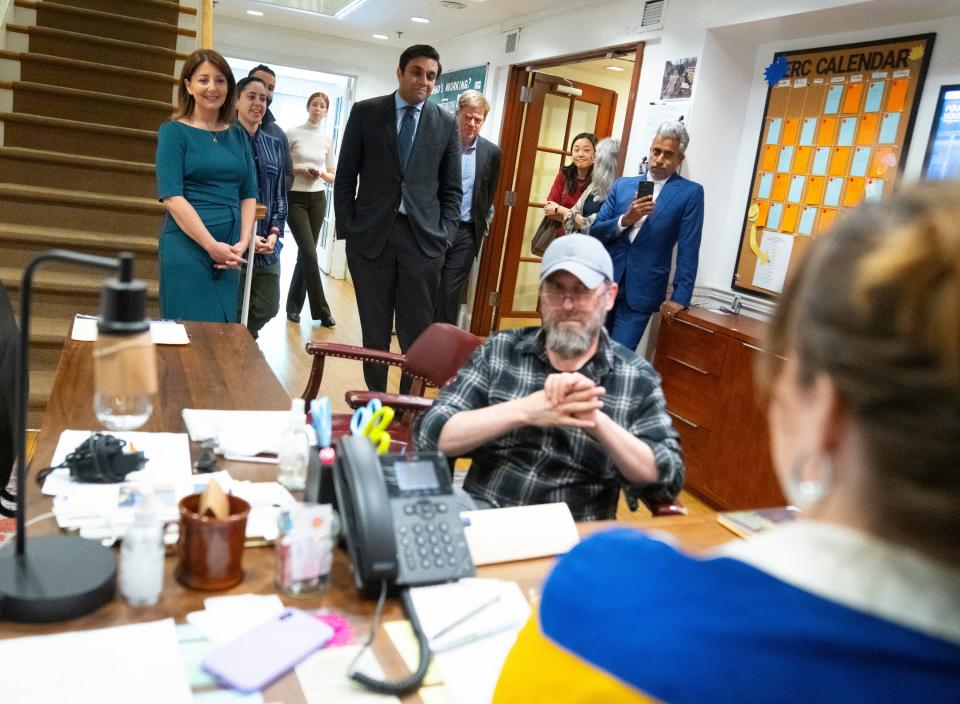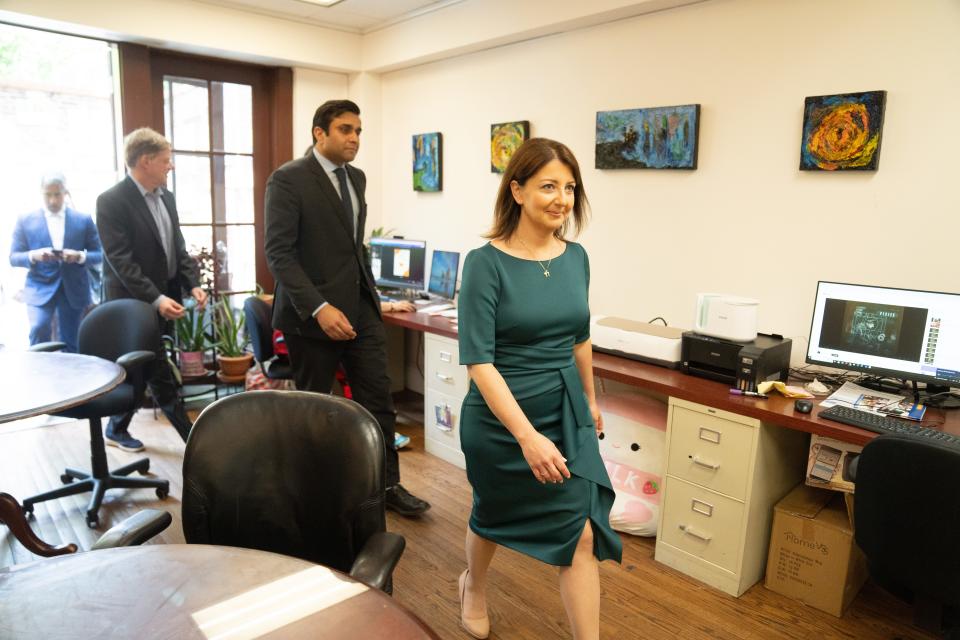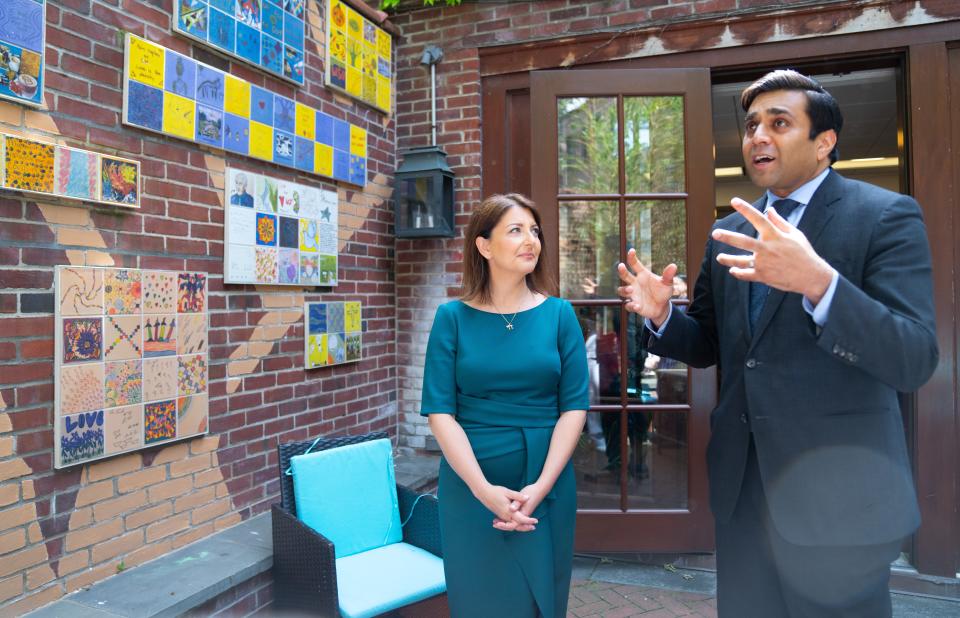What can prevent suicide? A place to call home, a person to reach out to
If you or someone you know needs mental health resources and support, please call, text or chat with the 988 Suicide & Crisis Lifeline or visit 988lifeline.org for 24/7 access to free and confidential services.
NEW YORK – Samantha Alexander calls Manhattan's Fountain House her “earthly salvation.”
Months ago, while living in a midtown homeless shelter, she attempted to take her own life. Despite being assigned male at birth, she'd known since she was young that she was female. She'd experienced chronic depression since childhood, and had tried various medications to treat it, she said.
After her attempt, she agreed to go with a friend to the Fountain House, a mental health nonprofit around the corner from the shelter. The organization helped her find treatment and a studio apartment downtown. She now spends nearly every day there mingling with friends, and discussing makeup and fashion. She also volunteers, doing office work and cleaning up.
Her sense of self is palpable, Alexander told USA TODAY. She was wearing a blue blazer, blue toenail polish and jewel-studded blue fingernails. “It’s the community,” she said. “It’s everything, baby.”
Alexander has experienced the type of interventions experts say are transformational. The program has drawn the attention of federal and local public health officials, who visited the Fountain House this week to understand strategies for addressing the rising U.S. suicide rate.
Exclusive: Health is political, Americans are divided. How new CDC head aims to fix that.

The U.S. recorded more than 49,000 suicides in 2021 and 2022, a historic high. Provisional data from 2023 appears to show the number of deaths by suicide, the majority being gun fatalities, has not declined.
The Biden administration has set an ambitious goal to break the cycle. The U.S. will aim to reduce the suicide rate by 20% by 2025, as part of a National Strategy for Suicide Prevention to address gaps and identify at-risk populations. The plan focuses on local, community-based suicide prevention programs that can assist in early interventions and offer direct interactions with people with lived experience to discuss risks and solutions. Another key goal is to reduce access to lethal means, such as firearms.
Dr. Mandy Cohen, the director of the Centers for Disease Control and Prevention, who joined the tour of Fountain House, said mental health and reducing deaths to suicide and overdose are a focus for public health officials. Mental health has broad political consensus, and data is needed to ensure the most effective methods are being promoted, she previously told USA TODAY. Cohen has been traveling across the country visiting places making an impact in mental health treatment. She visited a San Diego health center, a Nashville home-based mental health training program, and this week came to the clubhouse in New York City.
“We know in a moment of suicide, people feel isolated,” Cohen said in an interview Tuesday at Fountain House. “They feel like they don't have someone to reach out to. If you have the opportunity to be in a community, I think that helps.”

In the sun-filled brick townhouse just blocks from Times Square, officials witnessed people with severe mental illness helping to support and guide one another. The program offers gardening and study rooms for peer tutoring. A wall displays pennants of colleges that Fountain House participants have attended.
In its broader prevention plans, the CDC aims to ramp up resources such as the national 988 hotline in communities that don't have clubhouses like Fountain House, Cohen said. The call system has faced challenges due to a lack of funding, limited awareness and scarce resources for people in crisis, as USA TODAY reported.
Fountain House clubhouses in Manhattan and the South Bronx, see about 2,000 people. Participation is voluntary but it requires an application and a diagnosis of severe mental illness. The program is free. The model has been replicated in hundreds of places nationwide.
Ken Zimmerman, CEO of Fountain House, pointing to the cost-saving benefits of the program, noting the nonprofit reduced Medicaid expenses by 21% by reducing emergency hospitalizations, according to a 2017 New York University analysis. About 40% of participants are unhoused when they enter the program and nearly all find stable housing, Zimmerman said.
Mother's Day: These mothers lost children to opioid overdoses. On Mother's Day, they offer new approach.

“It's the antidote because it is intentionally focused on creating a place where everybody belongs and is needed,” he said. The goal is to welcome vulnerable people and "empower them to live their best lives.”
New York City Health Commissioner Ashwin Vasan, a former head of Fountain House, has created a sweeping mental health plan for the city to address serious mental illness, suicides and overdoses. The plan includes expanding clubhouses like Fountain House, and focusing on stabilization and prevention for people with severe mental illness, to avoid the cycle of crises and repeated hospitalizations and arrests.
Fountain House proves that community might have a bigger role to play in someone's therapy, he said.
Alexander volunteers to do secretarial work at Fountain House. She donated half her wardrobe to be used for the organization's fashion show later this month. She's known at the clubhouse for her makeup and fashion sense.
"Fountain House is my home away from home," she said. "I feel safe here. I feel not judged here."
After the officials left, Alexander cleaned with a vacuum as others chatted and studied quietly at computers.
Alexander's best friend in the program is Catherine Campbell, who has been coming to the clubhouse for 12 years.
Campbell, 38, is studying applied mathematics at John Jay College of Criminal Justice, an opportunity that came about following a computer programming internship she learned of at Fountain House. Studying helps with her schizophrenia.
On Tuesday afternoon, Campbell planned to hand out peppermints at the clubhouse. When she hands out candies, she typically says, “Praise God.” But first, she asks people if they'll be bothered by a religious blessing. The goal, she said, is simply to make sure people feel loved.
This article originally appeared on USA TODAY: CDC looks to treat US suicides. People find salvation in NYC clubhouse

